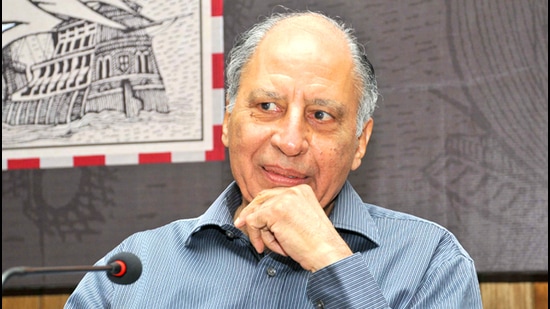Jul 13, 2024 09:13 PM IST
How did a “multi-hatted” police-intelligence man like Keki, now 87 years old, become a renowned poet at a young age?
Earlier this week, the Sahitya Akademi published A House of Words- Festschrift: In Honour of Keki N. Daruwalla, and organised a discussion on the poet, one of the most significant voices in Indian writing in English. Festschrift in German means “celebration writing”. The many significant poets who attended the online function spoke warmly about Keki, his poetry, his compassion, his aphorisms, or “Kekisms” as they called these and how he was always empathetic towards younger poets.

Keki and I were born in the same year in two countries that were once part of India: I in Yangon and he in Lahore. I worked with him in the same intelligence department since 1976, sometimes at different stations but always keeping in touch. He had joined earlier, after working as assistant superintendent of police in Uttar Pradesh from 1959 and a spell with the erstwhile Special Service Bureau till 1965. Between 1979 and 1980, he worked as the special assistant to then prime minister Charan Singh. In 1980-81, he was at Oxford University on study leave as a Queen Elizabeth II House Fellow. From then on, he was continuously with the Cabinet Secretariat, with a spell as a senior diplomat, doing national intelligence work till he retired in 1995 as chairman, Joint Intelligence Committee (JIC), which had the ultimate responsibility of integrating and interpreting strategic intelligence for the Cabinet. Post retirement, he was appointed as a member of the National Commission of Minorities from 2011 to 2014 when he had to undertake visits to different parts of the country to investigate cases of injustice against minorities. In between these heavy responsibilities, he wrote 17 books of poetry and fiction, many of which have been translated into Spanish, Swedish, Magyar (Hungarian), German and Russian.
How did a “multi-hatted” police-intelligence man like Keki, now 87 years old, become a renowned poet at a young age? He won the Sahitya Akademi award for his collection of poems, The Keeper of The Dead, forty years ago. Another book of poems, Landscapes, won him the Commonwealth Poetry Award (Asia) in 1987. His first novel, For Pepper and Christ, was shortlisted for the Commonwealth Fiction Prize in 2010.
It is said that sometimes creative writers prove to be good intelligence officers since both need curiosity, observation, imagination, and constant questioning to find answers. One finds that in abundance in Keki’s writings. In Dialogues with a Third Voice (1970), he asks: “How long must I sacrifice the body to the soul … lost in some vague, aesthetic future?” On rare occasions, the poet clashes with the policeman and professional angst sets in. Routine, a 1971 poem, describes the scene of police firing and concludes: “Depressed and weary we march back to the lines.” Five decades later, in Swamy and Friends, describing the tragic death of Father Stan Swamy in prison, he writes: “If you had no mai-baap, you were left to fate; no bail, more jail”. In between his official work, Keki would take time off, go into isolation in his own house and produce those gems. One of his ways to recharge his creative mind was by holding small marbles in his palm and gently shaking them!
Of all his works, my favourite is For Pepper and Christ (2009), a fictional account of Vasco da Gama’s voyage to my home state, Kerala. I was amazed at how he could describe the 15-16th century Calicut (Kozhikode) with such precision. He told me that he used to do research for the book at the American University library in Cairo while he was visiting his younger daughter, Rookzain. Let me conclude with an excerpt from his poem, Map-Maker (2002): “Perhaps I’ll wake up on some alien shore in the shimmer of an aluminium dawn, to find the sea talking to itself and rummaging among the lines I’ve drawn; looking for something, a voyager perhaps, gnarled as a thorn tree in whose loving hands, those map lines of mine, somnambulant, will wake and pulse and turn to shoreline, sand”.
Vappala Balachandran, former special secretary, Cabinet Secretariat, is the author of A Life In Shadow: The Secret Story of ACN Nambiar. The views expressed are personal
Story Saved


